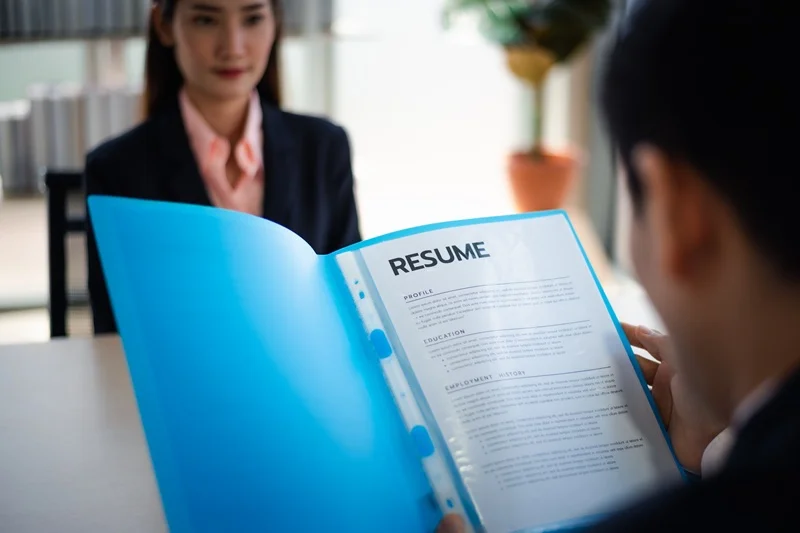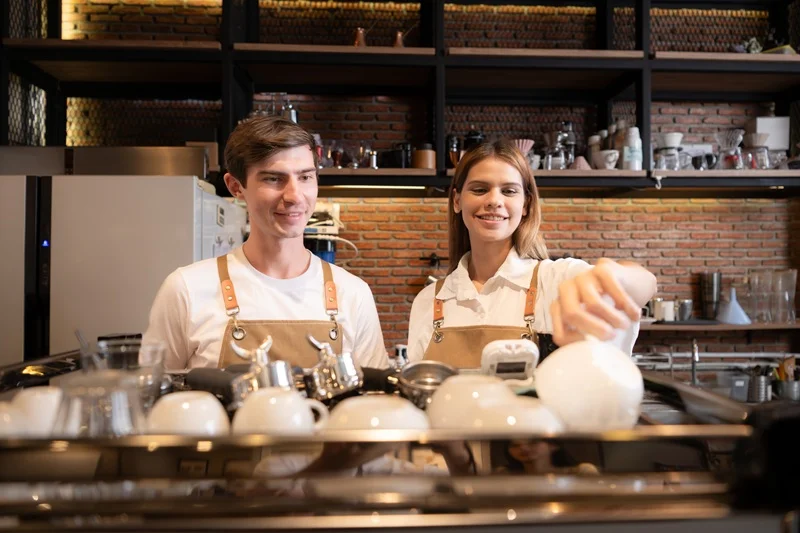Servers are the heart of every dining experience, ensuring each guest feels welcomed, attended to, and satisfied from the moment they enter until the final check is presented. Whether you work in a cozy neighborhood café or an upscale restaurant, your attention to detail and customer service skills directly shape how diners remember their visit.
To succeed in this role, it is essential to understand the full scope of a server job description, including daily responsibilities, required skills, and how the position differs from a waiter. This guide explains these details and shares practical tips on crafting a server resume that stands out to hiring managers in the hospitality industry.

Core Responsibilities in a Server Job Description
A well-crafted server job description outlines essential duties, skills, and qualifications that define the role of a restaurant server. Servers are the bridge between the kitchen and customers, ensuring that every guest enjoys a smooth and pleasant dining experience.
Here are the typical responsibilities included in a server job description:
- Greeting and seating guests: Welcoming customers warmly and escorting them to their tables set the tone for a positive dining experience.
- Taking accurate food and beverage orders: Servers must pay close attention to details, listen carefully to special requests, and record orders accurately.
- Delivering food and drinks promptly: Timely and efficient service demonstrates professionalism and enhances customer satisfaction.
- Ensuring table cleanliness: Maintaining a tidy table and service area is essential for hygiene and comfort.
- Processing payments: Handling cash, credit cards, or digital payments accurately is a vital part of daily operations.
- Collaborating with the kitchen and bar staff: Smooth coordination ensures orders are delivered correctly and on time.
- Upselling menu items: Recommending specials or pairings can increase restaurant revenue and improve the guest experience.
Successful servers combine strong customer service skills with attention to detail, multitasking abilities, and teamwork. In fine dining settings, they may also be expected to follow specific serving protocols and maintain a high level of professionalism.
What is the Difference Between Servers and Waiters?
The terms server and waiter are often used interchangeably, but there are subtle distinctions worth noting.
A waiter traditionally refers to someone who takes orders and serves food in a restaurant. The title is more common in formal or classic dining settings. On the other hand, “server” is a broader, more inclusive term widely used in modern restaurants, cafés, and hospitality establishments.
Here’s a quick breakdown of the differences:
| Aspect | Server | Waiter |
|---|---|---|
| Terminology | Gender-neutral, modern term | Traditional, gender-specific |
| Scope | May include other service tasks (hosting, bar assistance) | Primarily focused on taking orders and serving food |
| Setting | Common in casual to fine dining establishments | Often used in formal dining environments |
| Customer Interaction | Emphasizes overall guest experience | Focuses more on serving functions |
Most restaurants now use the term server because it emphasizes professionalism, inclusivity, and versatility. Knowing these distinctions allows job seekers to tailor their resumes and interview responses to align with employer expectations.
Essential Skills and Qualifications
A strong server job description highlights both hard and soft skills necessary for success in the hospitality field. Employers look for individuals who can manage multiple tasks while maintaining a positive and professional attitude.
Communication Skills
Servers must interact clearly and politely with guests, kitchen staff, and team members. Effective communication ensures orders are accurate and service runs smoothly. It also helps prevent misunderstandings and enhances the overall dining experience.
Customer Service
Providing exceptional service encourages repeat visits and positive reviews. Servers must remain attentive, approachable, and responsive to guest needs. A friendly demeanor creates a welcoming atmosphere that enhances customer satisfaction.
Multitasking
Servers often handle multiple tables, coordinate orders, and respond to guest requests simultaneously. The ability to stay organized and focused ensures timely service. Strong multitasking skills help maintain efficiency even during busy shifts.
Time Management
Delivering food and drinks promptly without compromising quality demonstrates professionalism. Servers must prioritize tasks effectively and pace their work to meet customer expectations. Good time management ensures a seamless dining experience.
POS System Proficiency
Modern restaurants rely on digital ordering and billing systems. Servers need to navigate POS systems accurately to process orders and payments efficiently. Familiarity with these tools reduces errors and speeds up service.
Food and Beverage Knowledge
Understanding menu items, ingredients, and potential allergens allows servers to answer customer questions confidently. Knowledgeable servers can make informed recommendations. This expertise enhances guest trust and satisfaction.
Teamwork
Servers work closely with chefs, bartenders, and hosts to coordinate smooth service. Cooperation and support among team members prevent delays and mistakes. Strong teamwork contributes to a harmonious and efficient restaurant environment.
Problem-Solving
Servers often encounter unexpected situations or guest complaints. The ability to address issues calmly and find effective solutions demonstrates professionalism. Problem-solving skills ensure guests leave with a positive experience despite challenges.
Qualifications and Experience
Most restaurants do not require formal education beyond a high school diploma. However, previous experience in food service or hospitality is a major advantage. According to a typical server job description, some establishments, especially fine dining venues, prefer candidates with specialized training or certifications such as:
- Food Handler’s Permit: Demonstrates knowledge of safe food practices.
- Alcohol Service Certification: Required in many locations for serving alcoholic beverages.
- Customer Service or Hospitality Training: Adds value for those aiming for higher-end establishments.
Servers with strong interpersonal and multitasking skills often progress to senior positions, such as head server, shift supervisor, or restaurant manager.

How to Write a Server Resume That Gets Noticed
Crafting a server resume that stands out requires more than listing responsibilities—it’s about showcasing achievements, personality, and professionalism.
Here are essential tips to write a winning resume for a server position:
1. Start with a Strong Summary
Begin with a short paragraph that emphasizes your experience, strengths, and service philosophy.
Example:
“Friendly and efficient restaurant server with 3+ years of experience in fine dining. Skilled in POS systems, menu knowledge, and delivering excellent customer experiences.”
2. Highlight Measurable Achievements
Employers value results. Include metrics where possible to illustrate your impact:
- “Served an average of 60+ guests per shift with a 95% customer satisfaction rating.”
- “Assisted management in training five new servers, improving team efficiency by 20%.”
3. Focus on Relevant Skills
Incorporate keywords from the server job description such as “customer service,” “order accuracy,” and “multitasking.” This ensures your resume passes through applicant tracking systems (ATS).
4. Showcase Soft Skills
Employers value professionalism, patience, and communication as much as technical skills. Describe instances where your attitude or initiative improved the dining experience.
5. Format for Readability
Keep your resume clean and easy to scan. Use clear section headings—Summary, Experience, Skills, and Education—and bullet points for concise impact.
6. Tailor Each Application
Modify your resume slightly for every job. Feature skills that align with the restaurant’s service style, whether casual dining or upscale.
7. Add a Polished Cover Letter
Pair your resume with a short, enthusiastic cover letter explaining why you’re passionate about providing excellent service and how your skills match the employer’s values.
A thoughtful, well-structured resume not only highlights your qualifications but also demonstrates the skills outlined in a typical server job description, reflecting the attention to detail every successful server must have.

Make Your Server Resume Shine and Impress Employers
A clear understanding of the server job description empowers you to present yourself as a confident and capable professional ready to deliver exceptional guest experiences. Whether you’re new to the industry or an experienced restaurant staff member aiming to advance, showcasing your skills, professionalism, and achievements can help you stand out in a competitive field.
Want your server resume to grab the attention of hiring managers? Let Resume Professional Writers help you craft a tailored, keyword-optimized, and professionally formatted resume that highlights your best qualities. Contact our expert team today and take the next step toward your dream hospitality career.
Frequently Asked Questions
What distinguishes a restaurant server from a banquet server?
A restaurant server typically manages a section of tables, providing personalized service by taking orders, delivering food, and attending to guest needs throughout the dining experience. In contrast, a banquet server often works at events or buffets, serving guests from a stationary station and focusing on efficient food distribution in a set environment.
What are the typical working hours for a server?
Servers may work full-time or part-time, with shifts varying based on the establishment’s hours. Common shifts include mornings, afternoons, evenings, weekends, and holidays, depending on the restaurant’s operating schedule.
What are the educational requirements for a server position?
Generally, servers are expected to have a high school diploma or equivalent. While formal education is not always required, some establishments may prefer candidates with a background in hospitality or customer service. Additionally, obtaining an alcohol certification may be necessary, depending on local regulations and the restaurant’s policies.
How can a server advance in their career?
Servers can pursue career advancement by gaining experience and demonstrating strong performance. Potential career paths include roles such as shift leader, supervisor, bartender, or restaurant manager. Developing leadership skills and a deep understanding of restaurant operations can facilitate progression into these positions.
What are the most important qualities for a successful server?
Key qualities include a friendly and polite demeanor, strong communication skills, and the ability to multitask effectively. Servers also need stamina to work long shifts and patience to handle challenging situations. These traits help ensure guests leave with a positive dining experience.








